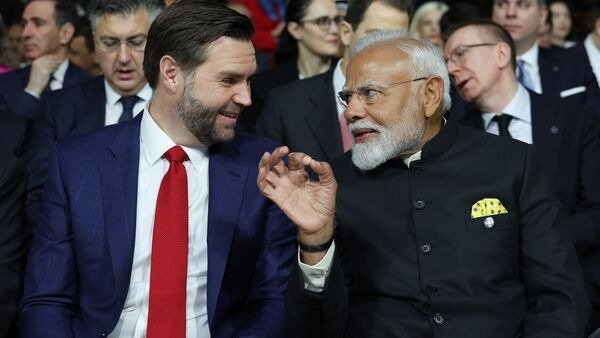The AI Action Summit in Paris on February 11, 2025, became a platform for global leaders to share their perspectives on the transformative power of Artificial Intelligence (AI). The event saw speeches from Indian Prime Minister Narendra Modi, US Vice President JD Vance, and French President Emmanuel Macron. Among the key discussions was the role of AI in shaping economic growth and employment.
JD Vance Endorses PM Modi’s Perspective on AI
During his speech, JD Vance unequivocally supported PM Modi’s stance on AI, emphasizing that AI is a tool for productivity and progress rather than a replacement for human intelligence. His remarks came in response to growing concerns about AI-driven job displacement and regulatory challenges.
“I appreciate Prime Minister Modi’s point. AI, I really believe, will facilitate and make people more productive. It is not going to replace human beings—it will never replace human beings,” Vance stated while addressing the summit. His views aligned with PM Modi’s optimism that AI will augment human potential rather than render people obsolete.
Vance further argued that many leaders in the AI industry misunderstand the impact of AI on the workforce. “Too many leaders in the AI industry, when they talk about the fears of replacing workers, really miss the point. AI is going to make us more productive, prosperous, and free,” he added.
PM Modi’s Vision: AI as a Catalyst for Change
Earlier, Prime Minister Modi delivered a powerful keynote speech, highlighting the transformative impact of AI on politics, economics, security, and society. He described AI as “writing the code for humanity in this century” and emphasized the need for responsible AI development. Modi reassured that while AI is seen as a disruptive force, history has shown that technology does not eliminate jobs; instead, it changes the nature of work and creates new opportunities.
“Loss of jobs is AI’s most feared disruption. But history has shown that work does not disappear due to technology. Its nature changes, and new types of jobs are created,” Modi explained. He called for a collective global effort to ensure AI remains a force for good, advocating for fair governance frameworks and unbiased AI models.
Vance Opposes Overregulation of AI
JD Vance also addressed the growing debate on AI regulations, warning against excessive oversight that could hinder innovation. He argued that overregulating AI could stifle technological advancement just as the industry is beginning to reach its full potential.
“We believe that excessive regulation of AI could kill a transformative industry just as it is taking off,” Vance said. He emphasized the importance of fostering AI-driven economic growth and called for policies that support technological progress. “We will make every effort to encourage pro-AI growth policies, and I would like to see that regulatory approach reflected in larger conversations at this conference,” he added.
AI and Ideological Neutrality: A Shared Vision
Another key point in Vance’s speech was the importance of keeping AI free from ideological and political influence. He stressed that AI must remain neutral and should not be used as a tool for censorship or propaganda.
“We feel very strongly that AI must remain free from ideological bias. American AI will not be co-opted as a tool for authoritarian censorship,” he declared.
PM Modi echoed similar sentiments, advocating for fairness and transparency in AI systems. “We must build quality data sets, free from biases. We must democratize technology and create people-centric applications,” Modi stated. Both leaders underscored the importance of ensuring AI serves humanity without becoming a means of political manipulation.
The US and India’s AI Partnership
Vance reaffirmed the United States’ commitment to leading global AI innovation and maintaining AI as a gold standard. He assured that the US will continue to support its international partners, including India, in advancing AI technologies for economic and social development.
“This administration will ensure that American AI technology continues to be the gold standard worldwide, and we are the partner of choice for other foreign countries and certainly businesses as they expand their own use of AI,” Vance said. His statements aligned with Modi’s call for collective global efforts to establish governance and standards in AI development.
Conclusion
The AI Action Summit in Paris underscored the significance of responsible AI development and international collaboration in shaping the future of technology. PM Modi and JD Vance shared a common vision that AI should be an enabler, not a disruptor, in the workforce. While concerns over AI-driven job losses persist, both leaders emphasized that AI would ultimately enhance human capabilities rather than replace them.
With AI rapidly evolving, the discussions at the summit highlighted the need for balanced regulation, ethical frameworks, and an inclusive approach to AI governance. As global leaders navigate the complexities of AI’s integration into society, the partnership between India and the US is poised to play a crucial role in defining AI’s future trajectory.

